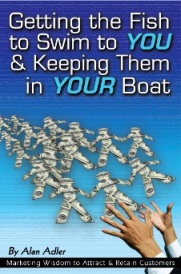ASK ALAN: Strong Employees Have These 7 Attributes

As a business owner, I want strong employees working for my company. It is consistently less work, less emotional, saves enormous amounts of time, money, resources, and relationships. Try looking for these, when recruiting, to maximize your business. Strong employees:
1. Empower themselves
You want people who empower themselves, so they do not depend on their peers or managers to feel good. People like this recognize that all they can do is try their best. And behave as if they:
A. Are confident.
B. Feel that they are good enough.
C. Choose to be happy on any given day.
This type of self-empowerment helps drown out the negative voices of other workers who may try to bully or convince them they lack the potential to succeed. |
2. Adapt to change
Whether it is changing work locations or not being able to be close to others during a pandemic. Strong employees understand that change is tough. But adapting to change helps an employee become a stronger person. Unfortunately, most of us do not spend enough time thinking about how we feel. In fact, even as adults, we tend to put more energy into fighting our emotions. You want people who can appropriately elaborate feelings and use words that put them in touch with their feelings. So, when they are faced with a major change, they can lessen the sting of negative emotions. |
3. Know when to say no
Everyone struggles to speak up, say no, or express their feelings occasionally. But depending on the situation, choosing not to say yes makes people stronger. I agree that it is a struggle to say no because it can feel awkward and weird. By finding the courage to do it more often, people find that it gets easier over time.
Strong employees find the courage to say no by coming up with polite ways to turn someone down:
• “No, I’m not able to.” (You do not always need to offer a reason.)
• “Thank you so much for inviting me, but I’ve got other plans.”
• “I’ll have to check and get back to you.” (They use this when they need some time to think about it.)
• “I am unable to do this today, but I will work it so that it gets done in a timely manner. |
|
4. Own their mistakes
Some employees are tempted to hide their mistakes because they want to avoid getting in trouble. Owning mistakes builds character. Strong employees also apologize and find ways to avoid making the same mistake again. |
5. Celebrate other people’s successes
So metimes employees feel resentful when they see others awarded preferred office space, newer technology, or other business-related perks. Acting out over those negative feelings only hurts them, and not the other party. Strong employees are supportive of their peers and focus on performing their best without worrying about how everyone else is doing. When people feel good about themselves, it is easier to celebrate other’s successes. |
6. Try, fail… and try again
Failure hurts — it can feel embarrassing, disappointing, and frustrating. But the most accomplished people fail along the way trying to reach their goals. They have growth mindsets that help them turn failures into positive learning experiences.
It would serve us well to remember Thomas Edison. Although he was credited with inventing the lightbulb, he also had more than 1,000 other inventions that did not work. |
7. They persist
It often takes longer than expected to reach a goal. When this occurs your brain may try to convince you to give up when you do not feel like putting in the hard work necessary to succeed. Those people who persist will continue to work hard even when they do not feel like it. They eventually succeed and discover that they are stronger than they initially thought. |
|
Adapted from the works of psychotherapist Amy Morin
About Alan
Alan Adler is an Executive Coach, Business Consultant, Speaker & Author.
22. March 2021 by Alan
Categories: ASK Alan |
Leave a comment










